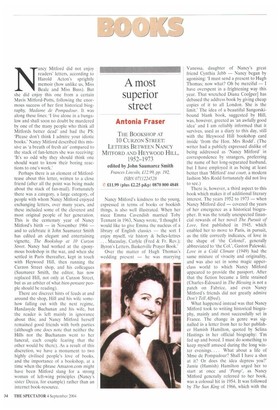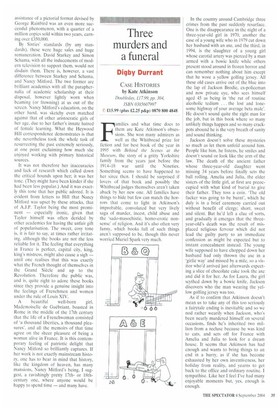A most
superior street
Antonia Fraser
THE BOOKSHOP AT 10 CURZON STREET LETTERS BETWEEN NANCY MITFORD AND HEYWOOD HILL,
1952-1973
edited by John Saumarez Smith Frances Lincoln, £12.99, pp. 192, ISBN 0711224528 t 111.99 (plus £2.25 p&p) 0870 800 4848 Nancy Mitford did not enjoy readers' letters, according to Harold Acton's sprightly memoir (how unlike us, Miss Beale and Miss Buss). But she did enjoy this one from a certain Mavis Mitford-Potts, following the enormous success of her first historical biography, Madame de Pompadour. It was along these lines: 'I live alone in a bungalow and shall soon no doubt be murdered by one of the many people who think all Mitfords better dead' and had the PS: 'Please don't think I admire your idiotic books.' Nancy Mitford described this missive as 'a breath of fresh air' compared to the stack of fan-letters she was receiving: 'It's so odd why they should think one should want to know their boring reactions to one's work.'
Perhaps there is an element of Mitfordtease about this letter, written to a close friend (after all the point was being made about the stack of fan-mail). Fortunately there was a category, a large category, of people with whom Nancy Mitford enjoyed exchanging letters, over many years, and these included some of the cleverest and most original people of her generation. This is the centenary year of Nancy Mitford's birth — in November 1904 — and to celebrate it John Saumarez Smith has edited an elegant and entertaining vignette, The Bookshop at 10 Curzon Street. Nancy had worked at the eponymous bookshop in the war, and when she settled in Paris thereafter, kept in touch with Heywood Hill, then running the Curzon Street shop, and his colleagues (Saumarez Smith, the editor, has now replaced Hill, not only at Curzon Street, but as an arbiter of what bien-pensant people should be reading).
There are discreet hints of feuds at and around the shop, Hill and his wife somehow falling out with the next regime, Handasyde Buchanan and his wife, but the reader is left mainly in ignorance about this; and Nancy Mitford herself remained good friends with both parties (although one does note that neither the Hills nor the Buchanans went to her funeral, each couple fearing that the other would be there). As a result of this discretion, we have a monument to two highly civilised people's love of books, and the importance of a bookshop, at a time when the phrase Amazon.com might have been Mitford slang for a strong woman of left-wing principles (Nancy's sister Decca, for example) rather than an internet book-resource. Nancy Mitford's kindness to the young, expressed in terms of books or bookish things, is also well illustrated. When her niece Emma Cavendish married Toby Tennant in 1963, Nancy wrote, 'I thought I would like to give Emma the nucleus of a library of English classics — the sort I enjoy myself, viz history & belles-lettres . . . Macaulay, Carlyle (Fred & Fr. Rev.); Byron's Letters, Baskerville Prayer Book.'
Over the matter of Hugh Thomas's wedding present — he was marrying Vanessa, daughter of Nancy's great friend Cynthia Jebb — Nancy began by agonising: 'I must send a present to Hugh Thomas; now what? Oh be merciful — I have overspent in a frightening way this year. That wretched Diana Coo[per] has debased the address book by giving cheap copies of it to all London. She is the limit.' The idea of a beautiful Sangorskibound blank book, suggested by Hill, was, however, greeted as 'an awfully good idea' and I am reliably informed that it survives, used as a diary to this day, still with the Heywood Hill bookshop card inside 'from the Hon. Mrs Radii'. (The writer had a publicly expressed dislike of being addressed as 'Nancy Mitford' in correspondence by strangers, preferring the name of her long-separated husband, but I have employed it as being at least better than `Mitford' tout court, a modern fashion Mrs Rodd fortunately did not live to see.)
There is, however, a third aspect to this book which makes it of additional literary interest. The years 1952 to 1973 — when Nancy Mitford died — covered the years of her emergence as a historical biographer. It was the totally unexpected financial rewards of her novel The Pursuit of Love, first published in 1945, which enabled her to move to Paris, in pursuit, as the title correctly indicates, of love in the shape of 'the Colonel', generally abbreviated to 'the Col.', Gaston Palewski. Love in a Cold Climate (1949) had the same mixture of vivacity and originality, and was also set in some magic upperclass world to which Nancy Mitford appeared to provide the passport. After that the fiction became a little strained (Charles-Edouard in The Blessing is not a patch on Fabrice, and even Nancy Mitford's friends did not greatly admire Don't Tell Alfred).
What happened instead was that Nancy Mitford took to writing historical biography, mainly and most successfully set in France. The change in genre was signalled in a letter from her to her publisher Hamish Hamilton, quoted by Selina Hastings in her official biography: 'I'm fed up and bored. I must do something to keep myself amused during the long winter evenings. . . What about a life of Mme de Pompadour? Shall I have a shot at it? Or does the idea depress you?' Jamie (Hamish) Hamilton urged her to start at once and 'Pomp', as Nancy Mitford generally referred to her book, was a colossal hit in 1954. It was followed by The Sun King of 1966, which with the
assistance of a pictorial format devised by George Rainbird was an even more successful phenomenon, with a quarter of a million copies sold within two years, earning over £350,000.
By Sixties' standards (by any standards), these were huge sales and huge remuneration. David Starkey and Simon Schama, with all the inducements of modern television to support them, would not disdain them. There is, however, a vast difference between Starkey and Schama, and Nancy Mitford. The two former are brilliant academics with all the paraphernalia of academic scholarship at their disposal, however lightly worn when beaming (or frowning) at us out of the screen. Nancy Mitford's education, on the other hand, was sketchy even matched against that of other aristocratic girls of her age, due to her father's innate hatred of female learning. What the Heywood Hill correspondence demonstrates is that she nevertheless took the whole task of resurrecting the past extremely seriously, at one point exclaiming how much she enjoyed working with primary historical sources.
It was not therefore her inaccuracies and lack of research which called down the critical hounds upon her; it was her tone. (They might have been kinder if she had been less popular.) And it was exactly this tone that her public adored. It is evident from letters to Hill that Nancy Mitford was upset by these attacks, that of A.J.P. Taylor being the most prominent — especially ironic, given that Taylor himself was often derided by other academics for having the unfair gift of popularisation. The sweet, cosy tone is, it is fair to say, at times rather irritating, although the books are not the less reliable for it. The feeling that everything in France is perfect, capital city, king, king's mistress, might also cause a sigh — until one realises that this was exactly what the French thought of themselves in the Grand Siècle and up to the Revolution. Therefore the public was, and is, quite right to adore these books since they provide a genuine insight into the feelings of Frenchmen and women under the rule of Louis XIV.
A beautiful well-born girl, Mademoiselle de Guebriant, boasted in Rome in the middle of the 17th century that the life of a Frenchwoman consisted of 'a thousand liberties, a thousand pleasures', and all the memoirs of that time agree on the sheer pleasure of being a woman alive in France. It is this contemporary feeling of patriotic delight that Nancy Mitford so brilliantly captures. If her work is not exactly mainstream history, one has to bear in mind that history, like the kingdom of heaven, has many mansions, Nancy Mitford's being, I suggest, a ravishingly pretty 17thor 18thcentury one, where anyone would be happy to spend time — and many have.



































































 Previous page
Previous page